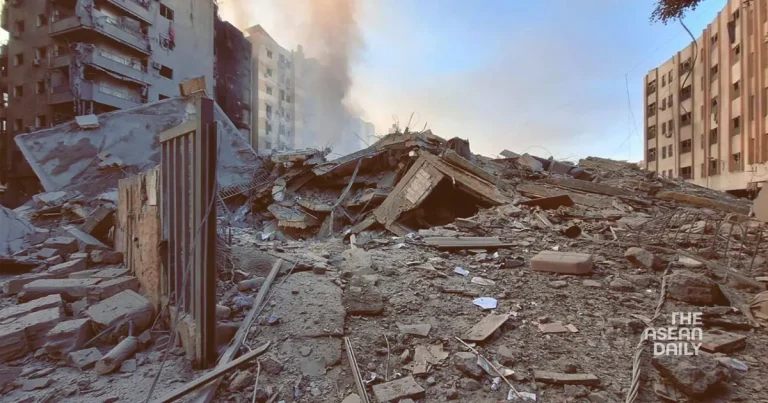28-9-2024 (BEIRUT) Israel has launched a series of intense air raids on Beirut’s southern suburbs, targeting Hezbollah strongholds and potentially its leadership. The strikes, which began early Saturday morning, mark a significant intensification of the conflict that has been simmering for nearly a year.
Residents of the Lebanese capital reported more than 20 airstrikes before dawn, prompting thousands to flee their homes in the southern suburbs. The mass exodus has led to scenes of desperation in downtown Beirut, with displaced families seeking refuge in public squares and along the seaside.
“They’re determined to obliterate Dahiye, to destroy us all,” said Sari, a man in his 30s who had evacuated following Israeli warnings. The newly displaced were seen attempting to rest on makeshift bedding in Martyrs Square, a stark reminder of the human cost of this escalating conflict.
Friday’s attack, described as the most powerful Israeli strike on Beirut during the current hostilities, reportedly targeted Hezbollah’s command centre and possibly its leader, Hassan Nasrallah. The fate of Nasrallah remains uncertain, with conflicting reports about his whereabouts and condition.
A senior Israeli official, speaking on condition of anonymity, confirmed that top Hezbollah commanders were targeted but remained cautious about the outcome of the strike. “It’s premature to draw conclusions… They sometimes conceal our successes,” the official stated.
The Israeli military has claimed the elimination of Muhammad Ali Ismail, commander of Hezbollah’s missile unit, and his deputy Hossein Ahmed Ismail. However, Hezbollah has not yet issued an official statement regarding these claims or the status of its leadership.
⚡️BREAKING: Over 20 different violent airstrikes by “Israel” all around the suburbs of Beirut, Lebanon.
This is a massacre being committed while the world remains silent. pic.twitter.com/5GW4TzkgrZ
— Suppressed News. (@SuppressedNws) September 27, 2024
The humanitarian toll of the conflict continues to mount, with Lebanese health authorities confirming six deaths and 91 injuries from Friday’s initial attack. The casualty count is expected to rise significantly following the latest barrage of strikes. Over 700 people have reportedly been killed in strikes over the past week, according to local authorities.
The escalation has raised fears of a potential wider conflict, with concerns that it could draw in Iran, Hezbollah’s primary backer, as well as the United States. Iranian officials have described the recent attacks as crossing “red lines,” while accusing Israel of using U.S.-made “bunker-busting” bombs.
International reaction has been swift, with calls for de-escalation coming from various quarters. At the United Nations, where world leaders gathered for the annual General Assembly, French Ambassador Nicolas de Riviere urged an immediate cessation of hostilities. U.S. Secretary of State Antony Blinken emphasised the need for a diplomatic solution, stating, “We believe the way forward is through diplomacy, not conflict.”
As the conflict intensifies, the humanitarian crisis deepens. An estimated 100,000 people in Lebanon have been displaced this week alone, bringing the total number of displaced to over 200,000. The situation remains volatile, with both sides showing no signs of backing down.




